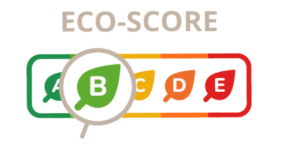Eco-Score – the new labelling headache?
Oktober 6th, 2023
Grayling Brussels explores the new French environmental labelling scheme and the wider European debate on sustainable labelling.
As the debate around Nutri-Score, the proposed EU-wide nutritional label, rages on, another player enters the arena. Eco-Score is the new environmental label developed in France and assigning food products a score depending on their environmental footprint.
The initiative is particularly timely as the European Commission’s Farm to Fork Strategy foresees the development of an EU sustainable labelling framework by 2024. The Commission will examine schemes already in place at Member State level before making up its mind on an EU-wide scheme. France’s Eco-Score will therefore likely influence the Commission’s work.
Both initiatives respond to increasing demands by consumers across Europe for an ecological impact label. A 2020 study found that 57% of consumers would be in favour of compulsory sustainability information on food labels. More recently, the Commission registered a European Citizens’ Initiative (ECI) on 30 June, calling for a “European eco-score”.

Image source: Eco-Score
Eco-Score will be familiar to many of you, as it is essentially the environmental sister of Nutri-Score. The system assigns food products and ready meals a score out of 100, with colour-coding and letters for consumer ease. The score takes into account various factors, such as the environmental policy of the producing country, the transport mode, or the seasonality of the product. Based on these factors, it presents an aggregate score, aiming at making every shopping decision quick and easy.
Nevertheless, the more environmentally minded among you may lament the lack of detail. Was this strawberry locally grown but out of season and with harmful pesticides, or was it grown across the globe but in a sustainable and organic fashion? Maybe you would favour one over the other, should the information be provided to you? This is the clear drawback with Eco-Score…
Eco-Score has already spread outside of France, with both Colruyt and Lidl currently running trial periods in Belgium and Germany, respectively. If Eco-Score continues to spread further and gain support, it does not seem unlikely that it could be taken up at EU level.
That said, the Commission has other alternatives at its disposal, including one of their own making. Indeed, the Commission already developed a pilot project on environmental labelling, called the Product Environmental Footprint (PEF). A study on this scheme revealed, without surprise, that complex labels with more information had a bigger impact on people’s choices, but only if they actually took the time to read and understand the label. Conversely, simpler labels with less information reached a wider audience but had a lesser impact on their choices.
The dilemma is obvious; is it better to change a few a lot or to change many a little? This will be a tough nut for policy makers to crack…
We are still a long way away from the Commission’s proposal on a sustainability label, but the requirements and objective of the future label gives us some clues as to what it may look like. Most important of all, any future label is to be used across the EU. This speaks strongly in favour of simpler labels with less detailed information, reaching a wide audience and overcoming language barriers.
Eco-Score presents all the above qualities. It is an easily understood label allowing consumers to make a decision with the glance of an eye, no matter who they are and what language they speak. Most people are further already familiar with how the label works, due to its similarities with Nutri-Score. This makes it a strong contender.
Nonetheless, some issues remain. Eco-Score faces criticisms for oversimplifying the environmental impact of products, the trade-off for being easily understood. Further, with a nutritional and a sustainability label, are we really making consumers’ lives easier? Or are we putting them in a situation where they may need to choose between their health or the environment? One could also wonder, why stop there? Couldn’t we envisage a “Socio-score”, taking into account the social and labour conditions of workers along the supply chain of a product? While no one can argue against the importance of proper consumer information, let’s just hope that we won’t have to bring our reading glasses to the grocery store in the future!


